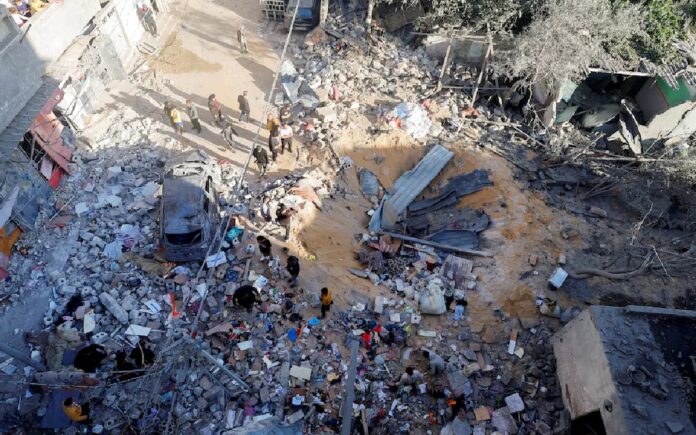Washington, D.C.: In a significant development, the Biden administration has expressed its apprehensions regarding Israel’s potential violation of international humanitarian law through the use of U.S.-supplied weapons during its military operations in Gaza. This stance marks the strongest criticism yet from Washington towards its ally, Israel.
However, the administration refrained from making a definitive assessment, citing the chaotic nature of the conflict in Gaza, which hindered the verification of specific instances where these weapons may have been implicated in alleged breaches.
This assessment was delivered in a comprehensive 46-page unclassified report from the State Department to Congress, as mandated under a new National Security Memorandum issued by President Joe Biden in early February.
The findings of this report risk further straining the relationship between the two allies, especially amid disagreements over Israel’s intentions to strike Rafah, a move that Washington has repeatedly cautioned against.
Also Read | Israeli Military Issues New Evacuation Orders in Rafah
Notably, the Biden administration has already halted one arms package in a significant policy shift and indicated a review of others, while reaffirming its long-standing support for Israel.
While the State Department’s report highlighted numerous credible accounts of civilian casualties and initially noted a lack of Israeli cooperation in enhancing humanitarian assistance to Gaza, it stopped short of conclusive judgments on whether any breaches of international law had occurred.
The report stated, “Given Israel’s significant reliance on U.S.-made defense articles, it is reasonable to assess that defense articles covered under NSM-20 have been used by Israeli security forces… inconsistent with its IHL obligations or with established best practices for mitigating civilian harm.”
Also Read | Israeli Strike Claims Lives of Lebanese Technician and Medic in South Lebanon
However, it also pointed out Israel’s failure to provide complete information to verify whether U.S. defense articles covered under NSM-20 were indeed used in actions alleged to violate international humanitarian law in Gaza, the West Bank, or East Jerusalem during the period under review.
Despite this, the administration reiterated its trust in Israel’s assurances regarding the lawful use of U.S. weapons.
Democratic Senator Chris Van Hollen criticized the administration for evading tough questions and failing to scrutinize whether Israel’s actions warrant a cessation of military aid.
Also Read | Flash Floods Claim 50 Lives in Baghlan Province, Afghanistan
The report highlighted the toll of the conflict, with over 34,000 Palestinians reportedly killed in Israel’s seven-month-long assault on Gaza. The war erupted following Hamas militants’ attack on Israel, resulting in significant casualties and abductions, according to Israeli sources.
Israel’s military conduct has faced mounting scrutiny due to the high death toll and extensive destruction in Gaza. Internal divisions within the U.S. State Department have also been reported, with officials from multiple bureaus expressing concerns over Israel’s actions.
Also Read | Solar Storm Disrupts Musk’s Starlink Satellites: Degraded Service Reported
Rights group Amnesty International has accused Israel of committing “serious violations” of international humanitarian and human rights law, citing specific instances of civilian casualties and unlawful use of lethal force with U.S.-supplied weapons.
The U.S. government’s review of reports questioned Israel’s compliance with legal obligations and best practices to mitigate harm to civilians. Concerns were raised over Israeli strikes on civilian infrastructure and densely populated areas, where civilian casualties appeared disproportionate to military objectives.
Also Read | Fatalities Reported in Ukrainian Drone Strikes on Russian Border Regions, Governors Confirm
Israel’s lack of full cooperation with international efforts to deliver humanitarian aid into Gaza following the conflict’s outbreak was noted in the report. However, it fell short of constituting a breach of U.S. law blocking arms provision to countries impeding humanitarian aid.
Israel’s commitment to investigating and holding violators accountable for incidents was acknowledged in the report, although no prosecutions resulting from internal investigations have been confirmed thus far.
The report underscored the challenges of conclusively determining whether U.S. weapons were involved in alleged violations, despite documenting instances of humanitarian worker casualties and military operations in protected sites.



